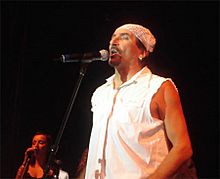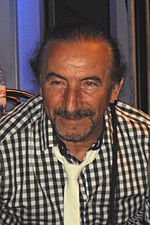Željko Bebek facts for kids
Quick facts for kids
Željko Bebek
|
|
|---|---|

Bebek performing in 2009
|
|
| Born |
Želimir Bebek
16 December 1945 |
| Other names | Željko |
| Musical career | |
| Genres | Rock, pop, disco, pop-folk |
| Occupation(s) | Singer |
| Instruments | Vocals, guitar, bass, mandolin |
| Years active | 1965–present |
| Labels | Jugoton, PGP-RTB, Diskoton, Croatia Records, Taped Pictures |
| Associated acts | Bijelo Dugme, Kodeksi, Jutro |
Želimir "Željko" Bebek (born 16 December 1945) is a famous singer and musician from Bosnia and Herzegovina and Croatia. He is best known as the lead singer of the popular rock band Bijelo Dugme from 1974 to 1984. After leaving the band, he started a very successful solo career, singing rock and pop music with a folk influence.
Early Life and Music Beginnings
Željko Bebek was born in Sarajevo, which was then part of Yugoslavia. From a young age, he loved music. He would sing songs he heard on the radio for his family and friends. He tried playing the harmonica, but soon switched to the guitar and singing. His teacher encouraged him to play the mandolin first, and he became very good at it before finally being allowed to play the guitar.
When he was sixteen, Bebek started performing at a school club called Eho 61. This was a place for students who loved music to show their talents. He later joined a band with the Redžić brothers, playing music and gaining experience.
Music Career Journey
Joining Kodeksi
In 1965, when Bebek was twenty, he was invited to join a band called Kodeksi. They played cover songs, which means they performed songs originally made famous by other artists. Bebek sang and played rhythm guitar, and the band became well-known in Sarajevo.
He suggested that Goran Bregović, a talented young musician, join Kodeksi as a bass player. This was the start of a long musical partnership between Bebek and Bregović, who would later create the famous band Bijelo Dugme. Bebek left Kodeksi in 1970 after some disagreements during a trip to Italy.
New Beginnings with Novi Kodeksi
After returning to Sarajevo, Bebek formed a new band called Novi Kodeksi. They continued to play cover songs, but audiences started wanting more original music. In December 1971, Bebek had to go for his mandatory military service. He decided to get married and thought about stopping music to settle down.
Forming Jutro
In early 1972, just before he went into the army, Bebek received an unexpected call from Goran Bregović. Bregović invited him to sing on a song for his new band, Jutro. Bebek agreed, recorded the song, and then left for his army duty.
When he finished his army service in March 1973, Bebek officially joined Jutro. He also took a job as a clerk, just in case the band didn't work out. But Jutro quickly became popular, and Bebek soon quit his office job to focus on music full-time. Jutro then changed its name and became the legendary band Bijelo dugme.
Bijelo Dugme Success
Željko Bebek was a founding member and the lead singer of Bijelo dugme from its start in 1974. The band became incredibly famous across Yugoslavia. Bebek spent ten years with Bijelo Dugme, recording six studio albums. He became a country-wide celebrity. In April 1984, he decided to leave the band to focus entirely on his solo music career.
Solo Music Career
Bebek's solo career actually began in the late 1970s, even while he was still with Bijelo Dugme.
Early Solo Albums
In 1978, when Bijelo Dugme was on a break, Bebek recorded his first solo album, Skoro da smo isti. He wrote and produced the songs himself. However, the album did not become a big hit.
In late 1983, as things were changing within Bijelo Dugme, Bebek recorded his second solo album, Mene tjera neki vrag. This album had some popular songs, but it was a duet he recorded around the same time that became a huge success. He sang "Jabuke i vino" (Apples and Wine) with Zana Nimani, and it became an instant hit, still loved by many today.
Hits After Bijelo Dugme
After leaving Bijelo Dugme, Bebek had many major hits, especially between 1984 and 1989. Many of his songs blended rock and pop with traditional folk music sounds. Some of his well-known songs include "Oprosti mi što te volim" (Forgive Me for Loving You), "Da je sreće bilo" (If There Had Been Luck), "Laku noć svirači" (Good Night Musicians), "Jabuke i vino" (with Zana Nimani), "Da zna zora" (If Dawn Knew, a duet with Halid Bešlić), "Čaša otrova" (Glass of Poison), and "Gdje će ti duša" (Where Will Your Soul Go). He also had popular ballads like "Žuta Ruža" (Yellow Rose) and "Ne idi sad" (Don't Go Now).
When the wars in Yugoslavia began, Bebek moved to Zagreb, Croatia, where he still lives and works today.
Bijelo Dugme Reunions
In 2005, Željko Bebek took part in three big reunion concerts with Bijelo Dugme. These concerts happened in Zagreb, Sarajevo, and Belgrade. He performed alongside other singers and musicians who had been part of the band over the years.
From 2006 to 2010, Bebek, along with two other Bijelo Dugme singers, Alen Islamović and Tifa, formed a tribute band called "B.A.T." They performed Bijelo Dugme songs around the world. A documentary called "B.A.T.: Balkan Rock Nostalgia" even followed them on their North American tour.
In 2012, Bebek released a new studio album called Kad poljubac pomiješaš sa vinom (When You Mix a Kiss with Wine). It was his first new album in twelve years and included songs like "Tango" (a duet with Severina Vučković). He continues to release new music and perform.
Personal Life
Željko Bebek has been married three times. He has a daughter named Silvija from his first marriage.
Later, he married Sandra Priganić, and they had a daughter named Bjanka. When the war started in Bosnia in 1992, Bebek and his family moved from Sarajevo to Zagreb, Croatia. They later divorced.
In 1997, Bebek met Ružica, who was much younger than him. They got married in April 2002. They have a son named Zvonimir and a daughter named Katarina, named after Bebek's parents.
Discography
With Bijelo Dugme
Studio albums
- Kad bi bio bijelo dugme (1974)
- Šta bi dao da si na mom mjestu (1975)
- Eto! Baš hoću! (1976)
- Bitanga i princeza (1979)
- Doživjeti stotu (1980)
- Uspavanka za Radmilu M. (1983)
Solo
Studio albums
- Skoro da smo isti (1978)
- Mene tjera neki vrag (1984)
- Armija B (1985)
- Niko više ne sanja (1989)
- Pjevaj moj narode (1989)
- Karmin pjesma i rakija (1990)
- ...A svemir miruje (1992)
- Gori svijet ti ćeš ga ugasiti (1993)
- Puca mi u glavi (1995)
- S tobom i bez tebe (1999)
- Ošini po prašini (2000)
- Kad poljubac pomiješaš sa vinom (2012)
- Ono nešto naše (2017)
- Mali oblak ljubavi (2021)
Singles
| Title | Year | Peak chart positions | Album |
|---|---|---|---|
| CRO |
|||
| "Dunavom" | 2019 | 3 | Non-album single |


